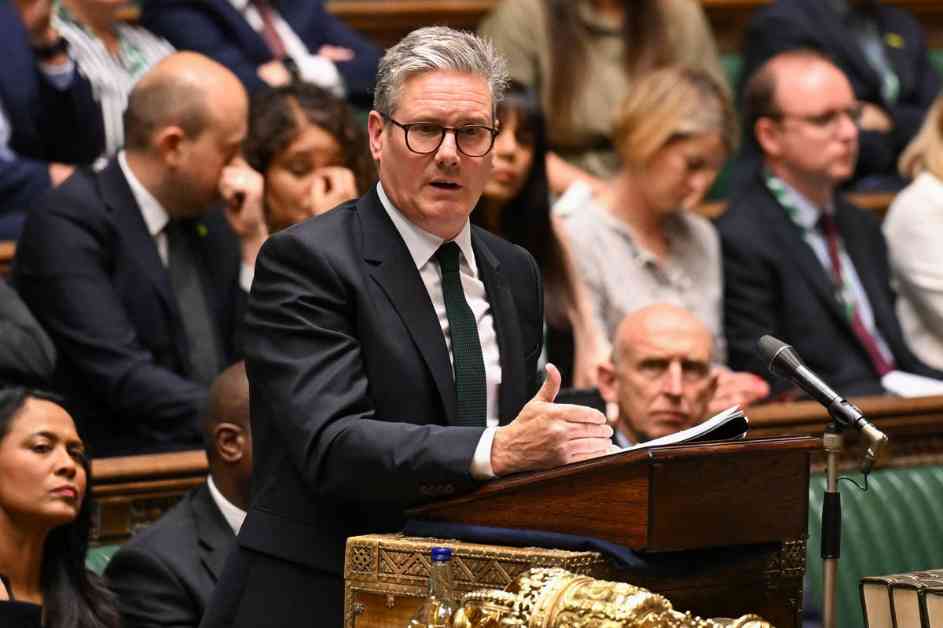MPs Debate Winter Fuel Payment Cuts
In a heated debate in the House of Commons, MPs are discussing Labour’s proposed cuts to the winter fuel allowance. This contentious issue has sparked fierce criticism and divided opinions among politicians and the public alike.
Sir Keir Starmer, the leader of the Labour party, has stood firm in his decision to make changes to the winter fuel allowance, despite facing backlash from his opponents. He emphasized the need for these changes during a recent address to the Trades Union Congress, stating, “I make no apologies for any of the decisions we have had to take to begin the work of change and no apologies to those still stuck in the 1980s who believe that unions and business can only stand at odds leaving working people in the middle.”
Concerns Over Austerity Measures
The debate over the winter fuel allowance cut has reignited concerns over austerity measures in the UK. TUC president Matt Wrack warned of a potential rise in far-right ideologies in communities that feel left behind by government policies. He expressed his opposition to the cut, highlighting the detrimental impact it could have on vulnerable individuals who rely on this assistance during the winter months.
Labour’s Cabinet has remained steadfast in their support for the proposed cut, citing the need to address a significant budget deficit left by the previous Conservative government. Downing Street has reiterated their commitment to implementing the cut, despite growing calls for reconsideration from within the Labour party and beyond.
Backbench Rebellion
As the debate continues, Sir Keir Starmer is facing a potential backbench rebellion within his own party. A group of 17 Labour MPs, including some who previously lost the party whip, have signed a motion calling for the government to delay the implementation of the winter fuel allowance cut. This internal dissent highlights the challenges faced by the Labour leader in maintaining party unity on this contentious issue.
The motion put forward by Neil Duncan-Jordan, a newly elected member of the parliamentary party, has garnered support from MPs across different factions within the party. The debate over the winter fuel allowance cut has exposed underlying tensions and differing perspectives on how best to address the budget deficit while supporting vulnerable individuals in society.
Impact on Vulnerable Individuals
The proposed cut to the winter fuel allowance has raised concerns about the impact it will have on vulnerable individuals, particularly the elderly and low-income households. This allowance plays a crucial role in helping people afford heating during the cold winter months, ensuring they can stay warm and safe in their homes.
Opponents of the cut argue that it will disproportionately affect those who are already struggling to make ends meet. With the cost of living on the rise and economic uncertainty looming, any reduction in essential support like the winter fuel allowance could push vulnerable individuals further into poverty.
As MPs debate the merits of the cut, it is essential to consider the real-world consequences for those who rely on this assistance. The decision to scale back the winter fuel allowance must be made with careful consideration of the impact it will have on the most vulnerable members of society.
Government Response
The government has defended its decision to cut the winter fuel allowance, citing the need to address the budget deficit and make tough choices to ensure fiscal responsibility. Prime Minister Boris Johnson has emphasized the importance of economic reform and has rejected calls to reverse the proposed cut.
Despite mounting pressure from opposition parties, advocacy groups, and some within his own party, the Prime Minister remains steadfast in his commitment to implementing the cut. This stance has further fueled the debate over the government’s priorities and its approach to supporting vulnerable individuals during challenging times.
In response to criticism, government officials have pointed to alternative forms of support available to vulnerable individuals, such as energy efficiency schemes and targeted assistance programs. However, critics argue that these measures may not adequately address the immediate needs of those who rely on the winter fuel allowance to stay warm and healthy.
Looking Ahead
As the debate over the winter fuel allowance cut rages on, the future remains uncertain for vulnerable individuals who rely on this essential support. The outcome of this debate will have far-reaching implications for those most in need, shaping the government’s approach to social welfare and economic reform in the coming years.
It is crucial for MPs to consider the human impact of their decisions and prioritize the well-being of vulnerable individuals in society. The debate over the winter fuel allowance cut is not just a political issue but a moral one, highlighting the importance of supporting those who are most at risk during challenging times.
As the debate unfolds in the House of Commons, the voices of vulnerable individuals must be heard and their needs prioritized in the decision-making process. The outcome of this debate will not only shape government policy but also reflect the values and priorities of society as a whole.












